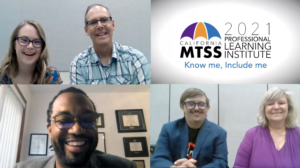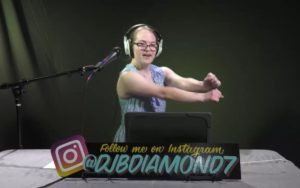More than 2,500 educators from throughout California gathered virtually this week for a three-day Professional Learning Institute aimed at sharing practices that support the academic, behavioral and social-emotional success of all students.
Reflecting the theme “Know Me, Include Me,” the event centered on promoting excellence, equity and access for all learners through the California MTSS framework and the California Department of Education’s School Conditions and Climate Work Group Recommendation framework.
Although held virtually for the first time, the event featured nearly 150 presenters who hosted sessions on a wide variety of topics such as building trauma-informed classrooms, social-emotional leadership, hiring with an MTSS mindset, using data to be an equity warrior, and more.
We caught up with Dr. Christine Olmstead, OCDE associate superintendent of Educational Services and head of the California MTSS leadership team, who shared highlights from this year’s conference.
Can you tell us a little bit about this year’s conference and the meaning of the theme “Know Me, Include Me?

The theme of the conference was building off our past theme of “Know my Name, Face and Story.” Our conference planning team was purposeful in moving beyond just knowing the name, face and story of our students and faculty and ensuring that their voices and contributions are included in decisions we make for teachers and students. We know that when students feel connected to caring adults at school, and see themselves represented in our lessons and curriculum, positive outcomes occur.
We want to ensure that all students regardless of their age, race, ZIP code, language, physical challenge, intellectual ability, capacity or competency are provided with the most inclusive and equitable learning environment. So when we say all students, we’re asking the question: Are all students being included every period, every day in the most inclusive and equitable learning environment? If we can easily answer “No” or name students or groups of students who we may not be including, we need to think about why. We need to ask what systems, structures, or policies we might need to refine to ensure that “all” truly means all.
For those unfamiliar with MTSS, can you give a short primer about the California framework and its importance in our local schools?
As the executive leadership team responsible for the statewide system of support’s scale up of California’s MTSS Framework, we often get asked why we say “All Means All.” California’s MTSS Framework focuses on instruction, differentiated learning, student-centered learning, individualized student needs and the alignment of systems necessary for all students’ academic, behavioral and social success and their overall well-being.
As we work to meet the needs of the whole child, we know classroom teachers and support staff can be their best when they are supported by the essential domains and features needed to ensure that a robust continuum of services is readily available and provided for every child the moment they need it, regardless of eligibility for other services.
The conference featured an impressive line-up of speakers and topics. Can you provide some brief highlights of the keynote sessions and breakouts?
As we worked through the pandemic and the reopening of the state, we had to make the decision last year to cancel the conference. But we knew we couldn’t go another year without providing one of the most highly-attended conferences for educators in the state of California. As we look forward to welcoming all students back on our campuses full-time in the next few weeks, we want to ensure that our students’ social-emotional wellbeing and mental health is addressed before jumping into any academic content learning.

So, we asked our keynote speakers, presenters and breakout sessions to provide content that would provide educators with ideas and resources to ensure that we are meeting the needs of the whole child. And by the whole child we mean the essential role that schools play in helping our students develop socially, emotionally, physically and academically.
We kicked off the conference with a keynote from Dr. Marc Brackett, whose area of expertise focuses on the role of emotions and emotional intelligence in learning, decision-making, creativity, relationship quality and mental health.
Day two, Dr. Tyrone Howard from UCLA talked to us about how to create inclusive and equitable spaces for all learners and challenged us to examine policies and practices that may exclude students who need us most.
And the final day of the conference featured Mirko Chardin, who talked to educators about the importance of creating powerful inclusive learning environments using Universal Design for Learning to meet the needs of all types of learners in our classrooms. We closed with Chardin hosting a discussion featuring panelists Sean McElwee from the show “Born this Way” and DJ B Diamond — aka Theresa Burnett — discussing how inclusive learning spaces have impacted their lives and the lives of those around them.
And finally, for me, one of the highlights of the conference — and I think I can speak for everyone — was DJ B Diamond. Her energy and spirit brought pure joy to all who attended.
For additional information about California’s MTSS Framework, you can check out www.ocde.us/mtss.
